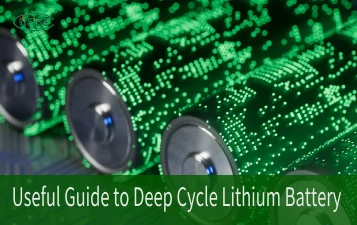In the field of battery technology, two main options often take center stage: lithium-ion and lithium-polymer batteries. These powerhouses dominate the landscape of modern energy storage, each offering distinct features and utilities. Exploring the comparison between lithium-ion and lithium-polymer batteries unveils a deeper understanding of their advantages and disadvantages
Part 1. What is a lithium battery?
Lithium-ion batteries
Lithium-ion batteries have long been the conventional selection for a multitude of portable devices.
Their design typically involves a liquid electrolyte that facilitates the movement of lithium ions between the anode and the cathode during charge and discharge cycles.
Li-ion batteries have gained widespread popularity due to their high energy density, relatively low self-discharge rate, and adaptability to diverse applications.
These batteries find extensive use in smartphones, laptops, power tools, and electric vehicles, showcasing their versatility and reliability.
Lithium polymer batteries
In contrast, lithium polymer batteries, often referred to as LiPo batteries, have garnered attention for their innovative design.
Unlike their liquid electrolyte counterparts, LiPo batteries incorporate a solid or gel-like electrolyte, contributing to their flexibility in shape and size.
This distinctive composition enables manufacturers to create thinner and lighter batteries, making them ideal for sleek and compact electronic devices.
While boasting higher energy density potential and flexibility in design, these batteries are prone to a slightly higher self-discharge rate compared to traditional Li-ion batteries.
Part 2. Lithium-ion battery advantages
High energy density: Li-ion batteries offer superior energy density compared to other rechargeable batteries, providing longer-lasting power for various devices.
Low self-discharge: These batteries have a relatively low self-discharge rate compared to other rechargeable batteries, retaining charge for extended periods.
Low maintenance: Li-ion batteries are virtually maintenance-free, eliminating the need for periodic discharge as they don’t have a memory effect.
Variety of applications: Their versatility allows them to power a wide range of devices, from small consumer electronics like smartphones to larger applications like electric vehicles.
Part 3. Lithium-ion battery disadvantages
Sensitivity to high temperatures: Exposure to high temperatures can significantly reduce the lifespan of lithium-ion batteries.
Safety concerns: Overcharging or exposing Li-ion batteries to extreme conditions can lead to safety hazards, including swelling, overheating, or, in rare cases, combustion.
Environmental impact: The disposal of lithium-ion batteries poses environmental challenges due to their composition, containing toxic materials that can harm ecosystems if not properly handled.
Part 4. Lithium polymer battery advantages
Flexible form factor: LiPo batteries can be manufactured in various shapes and sizes, offering designers more flexibility in product design.
Higher energy density potential: These batteries potentially provide higher energy density than conventional lithium-ion batteries, allowing more power in a smaller package.
Lightweight and slim design: Their thin and lightweight profile makes them suitable for ultra-thin devices, such as wearables and portable electronics.
Part 5. Lithium polymer battery disadvantages
Slightly higher self-discharge rate: LiPo batteries tend to have a slightly higher self-discharge rate compared to lithium-ion batteries, resulting in a quicker loss of stored energy when not in use.
Susceptibility to physical damage: Due to their thin and flexible structure, lithium polymer batteries are more vulnerable to physical damage, impacting their durability.
Complex charging requirements: Charging LiPo batteries requires specialized chargers and careful monitoring due to their sensitivity to overcharging, which can lead to safety risks.
Part 6. Difference between lithium polymer and lithium-ion battery
1. Battery composition
Lithium-ion batteries typically use a liquid electrolyte, whereas lithium polymer batteries utilize a gel-like or solid-state electrolyte.
LiPo batteries have a polymer electrolyte that enables flexibility in the battery’s shape and design, unlike the rigid structure of Li-ion batteries.
2. Battery construction
Lithium-ion batteries consist of separate compartments for the anode, cathode, and electrolyte, enclosed in a rigid casing.
Lithium polymer batteries have flexible packaging, allowing them to be molded into various shapes, making them more adaptable to different device designs.
3. Battery energy density
Lithium polymer batteries potentially offer a higher energy density compared to traditional lithium-ion batteries, providing more power in a smaller and lighter package.
LiPo batteries’ flexible packaging contributes to a higher energy density potential due to their varied form factors.
4. Battery safety and durability
Lithium polymer batteries are less prone to leakage, making them safer in certain applications where liquid electrolyte leakage could be hazardous.
Lithium-ion batteries are generally more rigid and less prone to physical damage due to their sturdier construction.
5. Battery charging requirements
Charging lithium polymer batteries requires specialized chargers due to their sensitivity to overcharging and specific voltage parameters.
Lithium-ion batteries have a broader range of compatible chargers, offering more flexibility in charging options.
6. Battery applications
Lithium-ion batteries extend across an array of electronic devices. These batteries have become the life force behind ubiquitous gadgets such as laptops, smartphones, and the ever-evolving electric vehicle industry.
Lithium polymer batteries make them a perfect fit for smaller, more compact devices. Their flexible form factor allows them to seamlessly integrate into sleek, modern gadgets like wearables, offering a power source that aligns perfectly with the sleek designs and reduced dimensions of these devices. Drones benefit from the lightweight and adaptable nature of lithium polymer batteries, enabling longer flight times and improved agility.
Part 7. Conclusion
Understanding these distinctions helps consumers choose the most suitable battery type based on their device requirements, whether they prioritize flexibility, energy density, safety, or specific charging needs.
Part 8. FAQs
-
Which is better lithium-ion battery or lithium polymer battery?
The choice depends on the specific requirements of the device or application; lithium-ion batteries offer stability and energy density, while lithium-polymer batteries provide flexibility in shape and size. -
Which is better Li-ion or Li polymer charger?
Generally, both lithium-ion and lithium-polymer batteries can be charged using the same charger as long as the voltage and current output match the battery’s specifications. -
Do lithium-ion batteries last longer than LiPo?
In general, lithium-ion batteries tend to have a longer lifespan compared to lithium polymer batteries, especially under similar usage and charging conditions. -
Do lithium-polymer batteries degrade if not used?
Yes, lithium polymer batteries can degrade over time if left unused for extended periods. Regular maintenance charging or storage at optimal charge levels helps mitigate degradation. -
How many times can you charge a lithium polymer battery?
A well-maintained lithium polymer battery can typically endure around 300 to 500 charge cycles before experiencing significant capacity loss, although actual longevity depends on usage patterns and maintenance.
Related Tags:
More Articles

Overview of Deep Cycle Lithium Battery
In this article, we explore the life, voltage, capacity, and charging considerations of deep cycle lithium batteries.
How Long do Lithium Batteries Last?
How long do lithium batteries last? we will explore the factors that influence the lifespan of lithium batteries and provide insights into their longevity.
How to Choose the Best LiFePO4 Battery?
Choose LiFePO4 batteries for superior performance, safety, and versatility in EVs, UPS, and backup power. This guide helps you make informed decisions.
Get 12v Lithium Car Battery As a Power Source for the Ride
Make the right choice for your vehicle's battery needs by installing a 12 volt lithium car battery. You will enjoy maintenance-free longevity with this change.
Everything About A Small Lithium Ion Battery
Discover the features, uses & future potential of a small lithium ion battery. A compact and tiny powerhouse ideal for smartphones, wearables, drones & more.





